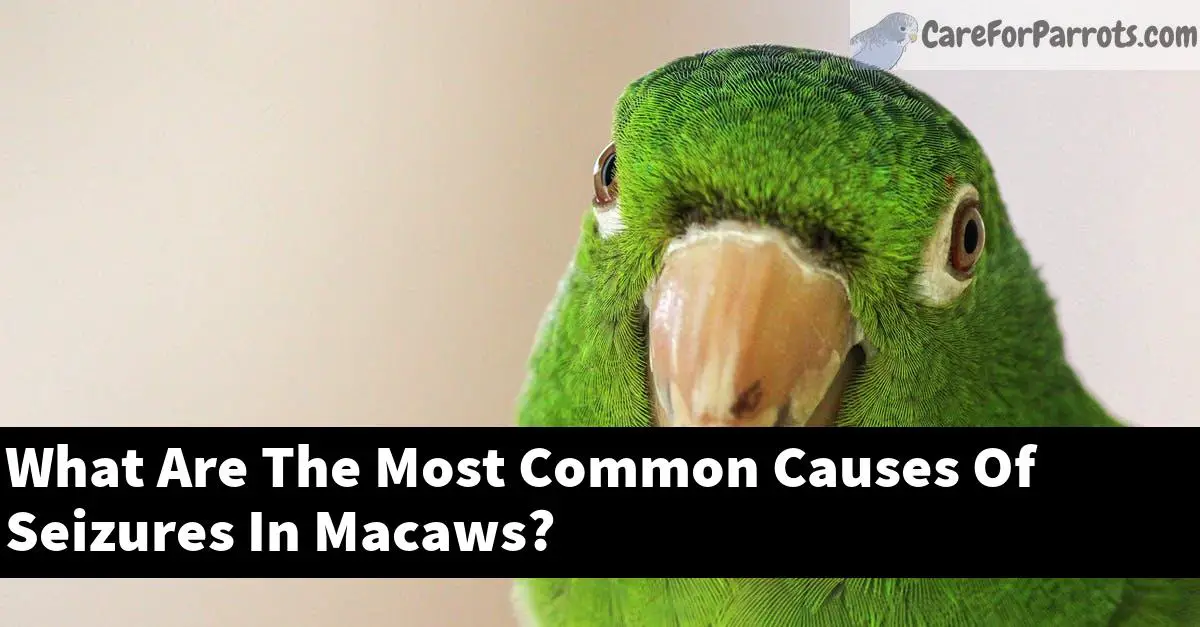There are many causes of seizures in macaws, but the most common are idiopathic (unknown) and neoplasia (cancer).
Table of Contents
What are the most common causes of seizures in macaws?
Seizures in macaws can be caused by a variety of factors. Some of the most common causes of seizures in macaws include:
1. Trauma: Seizures can be caused by a variety of injuries, including falls, collisions with other animals, and being hit by a thrown object.
2. Neurological disease: Seizures can be a sign of a serious underlying neurological disease, such as brain tumors or epilepsy.
3. Brain injury: Seizures can be a result of a head injury, which can cause damage to the brain.
4. Drug toxicity: Seizures can be a result of the ingestion of drugs, including prescription and over-the-counter medications.
5. Environmental factors: Seizures can be a result of environmental factors, such as exposure to toxins or bright lights.
What are the most common neurological problems in macaws?
There are many neurological problems in macaws, but the most common are:
Matiniy 2 Pcs Pirate Parrot on Shoulder Life Sized Artificial Parrot Toy for Costume Dress-up Accessory for Halloween Party(Multicolor)
$13.99 (as of 08/06/2025 20:08 GMT +03:00 - More infoProduct prices and availability are accurate as of the date/time indicated and are subject to change. Any price and availability information displayed on [relevant Amazon Site(s), as applicable] at the time of purchase will apply to the purchase of this product.)BBjinronjy Large Parrot Toys Bird Chewing Toys-Natural Nuts Corn Loofah Wooden Bird Cage Toy for African Grey,Macaws,Conure,Cokatoos,Cockatiel,Amazon Parrots and Other Medium and Small Birds
$12.99 (as of 08/06/2025 20:08 GMT +03:00 - More infoProduct prices and availability are accurate as of the date/time indicated and are subject to change. Any price and availability information displayed on [relevant Amazon Site(s), as applicable] at the time of purchase will apply to the purchase of this product.)Bissap 2 PCS Bird Chew Toys, Multicolored Bagel Cascade Bird Parrot Toy Biting Paper Cardboard Olympic Rings Conures Toys for Amazon Cockatiels Cockatoos Macaws and Similar Sized Pet Birds
$9.99 (as of 08/06/2025 20:08 GMT +03:00 - More infoProduct prices and availability are accurate as of the date/time indicated and are subject to change. Any price and availability information displayed on [relevant Amazon Site(s), as applicable] at the time of purchase will apply to the purchase of this product.)1. Neurological disorders, such as brain tumors and strokes
2. Neurological problems caused by the bird’s environment, such as lead poisoning and parasites
3. Neurological problems caused by human care, such as mistreatment and avian influenza
How can you prevent seizures in macaws?
There is no surefire way to prevent seizures in macaws, but there are a number of steps that can be taken to help reduce the risk. One key way to reduce the risk of seizures in macaws is to keep them well-fed and hydrated.
Macaws that are not well-nourished are more likely to experience seizures, and macaws that are dehydrated are more likely to experience water intoxication, which can lead to seizures. Additionally, it is important to keep macaws safe from potential sources of seizures, including dangerous metal objects and other animals.
What are the early signs of a seizure in a macaw?
There are a few early signs that may indicate that a seizure may be occurring in a macaw. One indication may be an abrupt change in behavior, such as a macaw becoming agitated or becoming unresponsive to its owner.
Other signs may include a macaw trembling or swaying, making unusual vocalizations, or having difficulty walking or sitting. If a seizure is suspected, it is important to seek medical attention as soon as possible.
What should you do if your macaw has a seizure?
If your macaw has a seizure, the first thing you should do is call your veterinarian. seizures can be a sign of a serious illness, and your veterinarian will be able to determine the cause and recommend the appropriate course of action.
How can you tell if a seizure is serious in a macaw?
Seizures can be serious in any bird, but are more common in parrots. Some signs that a seizure may be serious in a macaw include:
• The bird becomes very agitated or restless
• The bird has bloodshot eyes or a swollen face
• The bird is unresponsive to verbal commands or physical touch
• The bird has unusual vocalizations, such as high-pitched squeals or crowing
• The bird has seizures in multiple locations, such as the head, neck, and beak
What is the prognosis for a macaw with seizures?
There is no definitive answer, as the prognosis is highly variable depending on the extent and severity of the seizures, the bird’s general health and age, and the treatment plan implemented. In general, however, most macaws who experience seizures will usually make a full and complete recovery.
However, due to the unpredictable nature of seizures, it is always best to consult a veterinary professional if there are any concerning symptoms or changes in the bird’s behavior.
Summary
Seizures in macaws are caused by a variety of things, but the most common are idiopathic and neoplasia.
























